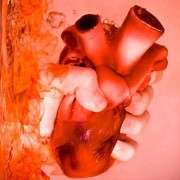 Photo: Getty Images
Photo: Getty Images
Today I will continue our discussion of post-traumatic stress disorder (PTSD) and how it can increase the rate of heart disease and the progression of the disease in our returning veterans. To quickly review the definition of PTSD, it is the development of certain symptoms following a mentally stressful event that involved actual death or the threat of death, serious injury, or a threat to oneself or others. A study in the American Journal of Cardiology found that our returning veterans have a higher rate of being diagnosed with heart disease or their heart disease becoming more severe if the person has also been diagnosed with PTSD.
To be clear, the study doesn’t state that PTSD causes heart disease, but instead that it can be a contributing risk factor for heart disease in people who have been diagnosed with PTSD. There are several symptoms that contribute to heart disease; one of them is narrowing of the arteries. When the arteries are narrowed there is less blood that can get through. Once the arteries are blocked that can cause a heart attack. The study found that 75 percent of the veterans with PTSD had narrowing of their arteries whereas only 59 percent of the veterans without PTSD had narrowing of their arteries. For those veterans who were diagnosed with heart disease during the initial study there was a three-and-a-half year follow- up which found that 17 percent of the veterans with PTSD had died compared to only 10 percent of veterans who did not have PTSD. The study also mentioned that the stress hormones that are elevated in people with PTSD could be contributing factors as well as the negative lifestyle behaviors such as heavy alcohol use or smoking. Stress, alcohol use and smoking are also risk factors in heart disease.
The study was conducted with mostly male participants but it still has important information for women, because approximately 1.8 million women are serving in our military. Female veterans are also one of the fastest growing segments of the veteran population. Moreover, researchers reported this week at the annual meeting of the American Psychiatric Association that women are twice as likely to suffer from PTSD than their male counterparts. This study can be a wake call for women to investigate their mental health as they come back from combat. The more our women veterans can be screened and treated for PTSD, the better mental and physical health they can experience for the rest of their lives.
The message that I would like to get across to women veterans or anyone with PTSD is this: if you think you have symptoms, get the assessment to find out if you have PTSD. If you have PTSD, get treatment which in turn can reduce your chance of creating negative lifestyle behaviors to cope with the condition and perhaps reduce the risk of other diseases.
Sources
http://www.reuters.com/article/2011/05/31/us-heart-idUSTRE74U0EL20110531
http://www.webmd.com/cancer/tc/ncicdr0000062831-diagnosis-and-symptoms
http://nmvboc.org/women-veterans/
Reviewed June 2, 2011
Edited by Alison Stanton
Live Vibrantly,
Dr. Dae
Dr. Dae's website: www.healthydaes.com
Dr. Dae's book: Daelicious! Recipes for Vibrant Living can be purchased @ www.healthydaes.com
Dr. Dae's Bio:
“Dr. Dae" (pronounced Dr. Day) Daemon Jones is a Naturopathic Physician who treats the whole person using safe and effective combinations of traditional and natural methods to produce optimal health and well-being in the lives of her patients.





Add a CommentComments
There are no comments yet. Be the first one and get the conversation started!